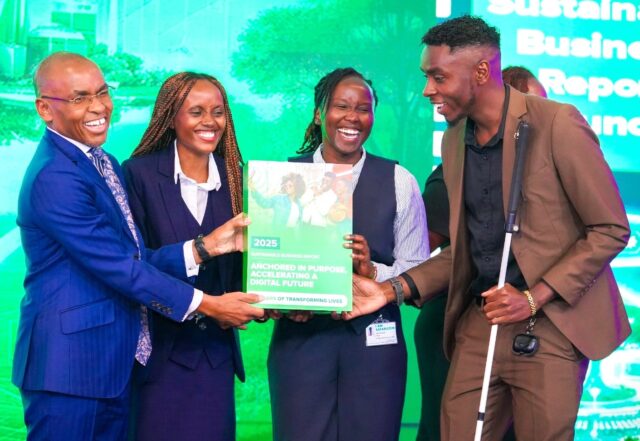
Telecommunications company Safaricom PLC has reported a total economic, social, and environmental impact valued at KSh 1.1 trillion for the 2024/2025 financial year, marking the first time the company’s “True Value” has crossed the trillion mark.
The figure, which is 16 times greater than the company’s financial profit, was revealed in Safaricom’s 2025 Sustainable Business Report, released on Monday. The report also shows that the company contributed KSh 809 billion to Kenya’s Gross Domestic Product (GDP) through its operations.
According to Safaricom, the surge in True Value was driven by enhanced value creation for customers, agents, and merchants through M-PESA, increased Corporate Social Investment initiatives, and expanded capital and operational expenditure impacts.
True Value is a comprehensive measure of a company’s total impact beyond financial returns, encompassing its economic, social, and environmental contributions. It helps quantify both positive and negative externalities generated by business operations to guide more sustainable and inclusive decision-making.
“Over the past 25 years, Safaricom has evolved into a purpose-led technology company guided by one simple mission: to transform lives by connecting people to people, people to opportunity, and people to information,” said Dr. Peter Ndegwa, CEO of Safaricom PLC. “At the heart of this journey is sustainability, embedded not as an obligation, but as a business imperative.”
The 2025 report, themed “Anchored on Purpose, Accelerating a Digital Future,” highlights how Safaricom continues to leverage innovation, partnerships, and technology to drive impact across education, healthcare, digital inclusion, and financial access.
Environmental Impact
During the year, Safaricom planted over 830,000 trees and restored 694 hectares of land across eight counties, engaging more than 4,000 community members. Cumulatively, the company has grown 2.3 million trees, working toward a target of 5 million by 2030.
The company also achieved CDP A-list recognition on Climate Change and Supplier Engagement, maintained a 99% recycling rate, and collected 190 tons of e-waste and 62 tons of plastic through M-PESA Green Points. Additionally, Safaricom fenced 15 kilometers of Kakamega Forest as part of its conservation efforts.
Social Impact
Safaricom recorded a rise in smartphone penetration, growing from 22.9 million to 27.3 million devices on its network. Through the Spark Fund Accelerator Programme, nine early-stage startups received financial and technical support.
Under its DigiFarm initiative, Safaricom disbursed KSh 945 million in credit through 169,000 loans, benefiting smallholder farmers—36% of whom were women and 17% youth.
Diversity, Equity and Inclusion
Gender representation across Safaricom employees stood at 51% male and 49% female, with women holding 45% of senior leadership roles. The report also shows that 3.6% of staff are persons with disabilities (PwDs).
The company said the use of Artificial Intelligence (AI) for personalized customer offers drove a 15.2% year-on-year growth in mobile data revenue and a 14% increase in usage per customer.
Governance and Data Protection
Safaricom was awarded the ISO 27701 certification, the highest global standard in Privacy Information Management Systems (PIMS), demonstrating its commitment to customer data protection across GSM and M-PESA services.
The company also enhanced transparency by integrating IFRS disclosures alongside Global Reporting Initiative (GRI) standards and achieved an 87% reduction in fraud cases through AI-driven detection systems.
“We detected poaching-related revenue flows through M-PESA, identifying 14 poachers who were reported to the Financial Reporting Centre,” the report notes, highlighting the company’s vigilance in anti-money laundering efforts.
Now in its 14th year, the Sustainable Business Report underscores Safaricom’s long-term strategy to align profitability with social and environmental progress as it continues to transform into a purpose-led technology company.


































